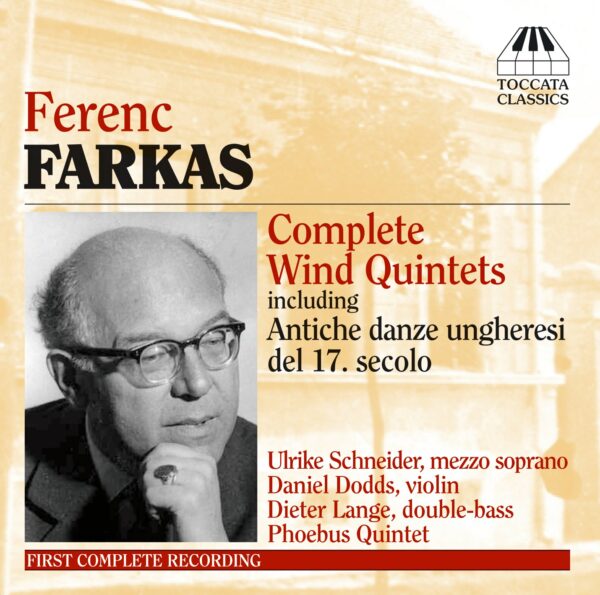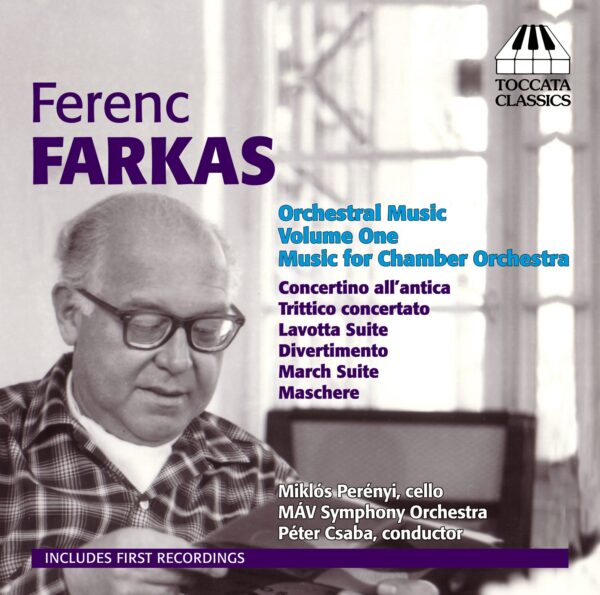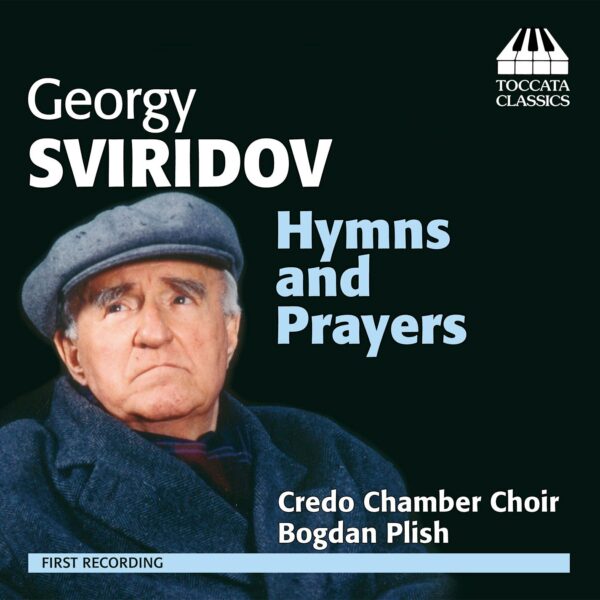Ferenc Farkas: Complete Wind Quintets
Catalogue No: TOCC0019
EAN/UPC: 5060113440198
Release Date: 2006-04-02
Composer: Ferenc Farkas
Artists: Barbara Zumthurn-Nünlist,
Christoph Bösch,
Daniel Dodds,
Dieter Lange,
Dimitri Ashkenazy,
Martinů Roos,
Phoebus Quintet,
Susan Landert,
Ulrike Schneider
Ferenc Farkas (1905–2000) was one of the longest-lived members of the wave of Hungarian nationalist composers which began with the rise of Béla Bartók and Zoltán Kodály. A student of Ottorino Respighi in Rome, Farkas blended Respighi’s Latin melodiousness with the Magyar folk-heritage that Bartók and Kodály had made the central element of Hungarian music. His Old Hungarian Dances of the 17th Century have become a staple of the wind-quintet repertoire; the other five works on this disk display the same irrepressible joie de vivre.
Ulrike Schneider, mezzo soprano
Daniel Dodds, violin
Dieter Lange, double-bass
Phoebus Quintet, wind quintet
Christoph Bösch, flute
Barbara Zumthurn-Nünlist, oboe
Dimitri Ashkenazy, clarinet
Martinů Roos, horn
Susan Landert, bassoon
Listen To This Recording:
-
Serenade for woodwind quintet
- Allegro
- Andante espressivo
- Saltarello
- Intrada
- Scherzo
- Petit poËme
- Rondo
- Gáspár (Punch ~ Kaspar ~ Bastide)
- Ládika (The Magic Box ~ Das Zauberkästlein ~ Le pot de fer)
- Marasztalás (Sunbeams ~ Sonnenstrahlen ~ Supplication)
- Falusi reggel (Morning in the Village ~ Dorfmorgen ~ Le coq et l’‚ne)
- Mondóka (Violets ~ Veilchen ~ Violette)
- A kőbéka (The Stone Frog ~ Der Steinfrosch ~ Le crapaud)
- Altatódal (Lullaby ~ Wiegenlied ~ Berceuse)
- Száncsengo (Sleighbells ~ Schlittenschellen ~ La cloche du traineau)
- Békakirály (Frog King ~ Froschkönig ~ Le roi des grenouilles)
- A Tündér (The Little Elf ~ Das Elflein ~ La fée Bòbita)
- Paprika Jancsi szerenádja (Harlequin Serenade ~ Hanswurst-Serenade ~ Sérénade de Pierrot)
- Déli felhők (Midday Cloud ~ Mittagswolken ~ Dans les nuages)
- Intrada
- Lento
- Danza della scapole
- Chorea
- Saltarello
- Rondo cappriccio for violin and woodwind quintet
- Indulás Pannónia felé (March to Pannonia ~ Marsch nach Pannonien ~ Marche vers la Pannonie)
- Menüett (Minuetto) (Minuet ~ Menuett ~ Menuet)
- Lassú verbunk és figura (Slow Verbunkos and Figura ~ Langsamer Werbungstanz und Figura ~ Verbunkos lent et figura)
- Német táncnóta (German Dance-tune ~ Deutsche Tanzweise ~ Chanson de danse allemande)
- Rondo Vigadőzás a korcsmában (Rondo in the Inn ~ Rondo im Wirtshaus ~ Rondo dans la taverne)
Quattro Pezzi for double-bass and woodwind quintet
Gyümölcskosar (Fruit Basket) Song-cycle for soprano and wind quintet based on poems by Sándor Weöres (1980)
[Song-cycle for soprano and wind quintet based on poems by Sàndor Weöres (1913t89)]
Antiche danze ungheresi del 17. secolo (Old Hungarian Dances of the 17th Century) for woodwind quintet
Lavottiana for woodwind quintet





MusicWeb International :
‘…the music is extremely appealing, superbly crafted and warmly expressive.[…] I thoroughly enjoyed this generously filled, superbly played and well recorded release. Why is music such as this not heard more often, let alone recorded? Where would we be without all these smaller, independent and enterprising labels who bravely record unfamiliar, but generously rewarding repertoire? In short, full marks to all concerned. A really lovely disc to be enjoyed from first to last.’
—Hubert Culot, MusicWeb International
Music & Vision :
‘You couldn’t ask for more, and it just makes you realise that it’s true what they say: forget the majors, it’s the dedicated, music-driven indies who are doing the real work. Thank you all concerned, for giving me Ferenc Farkas.’
—Paul Sarcich, Music & Vision
Musical Pointers :
‘All the music is accessible but never boring, and he occasionally flirts with serialism, but never dogmatically.
The CD is a winner through the inclusion, amongst works for standard wind quintet, of three featuring soloists, double bass (his son played it), violin, and voice (Children’s Songs). These have quirky, inconsquential texts and cry out to be sung by gifted children.’
—Peter Grahame Woolf, Musical Pointers
BBC Music Magazine :
‘In volume of output, Ferenc Farkas (1905-2000) is something of a Hungarian Villa-Lobos, and his Serenade from 1951 has a touch of the Brazilian composer’s fluid fecundity of invention. The Phoebus Quintet perform with deftness, wit and nimble mastery. It’s an old cliché of critical special pleading, I know, but here is music which really does deserve to be much better known.’
—BBC Music Magazine
Tempo :
‘the singer and wind quintet in this performance sound beautifully matched.’
—Peter Palmer, Tempo, October 2006
What’s on in London :
‘The music collected here is witty, charming and beautifully crafted’
—Colin Anderson, What’s on in London